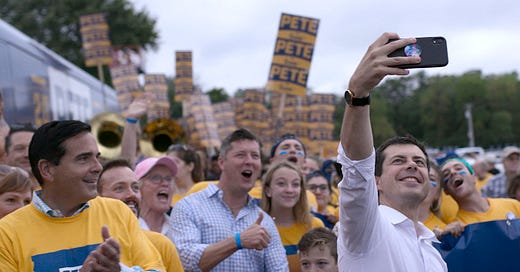Mayor Pete
An intimate portrait of South Bend Mayor Pete Buttigieg during his meteoric presidential campaign that shows him to be exactly the smart, earnest man we saw.
This review is free content. Please consider subscribing now to Film Yap to enjoy everything we produce plus exclusive opportunities!
“I only got so far… but not that many people get that far.”
Like a lot of Hoosiers, I viewed the announcement by Pete Buttigieg, the mayor of the city of South Bend, for President of the United States as a exercise in pure windmill-tilting. Here was a promising young man looking to make a name for himself, and the chances for a Democrat winning statewide office in red Indiana were slim — so why not take a swing at the big leagues?
Nobody expected Buttigieg, a military veteran and Harvard grad who came out as gay after his first term as mayor and then won reelection with 80% of the vote, to rocket up the polls and actually win the Iowa caucuses in a squeaker over Sen. Bernie Sanders.
Yet, somehow director Jesse Moss and his crew knew that the mild-mannered, diminutive Buttigieg — who was just 37 at the time, but looked 25 — would amount to something. “Mayor Pete,” their excellent new documentary, chronicles the campaign from virtually day one until he finally conceded the race after failing to gain traction in other states after Iowa.
Unlike most political documentaries, like “Journeys with George” about President George W. Bush, Buttigieg never seems like he’s performing for the cameras.
Smart, introverted and wonky, the mayor launches his campaign with the idea that maybe his campaign doesn’t have to be like everyone else’s. What about an election run that focuses on ideas, not attacking other candidates and being honest to a fault?
We get copious interviews with Buttigieg and the key players, including campaign manager Mike Schmul and communications director Lis Smith. There were savvy insiders who knew the game of national politics in a way Buttigieg did not. We watch them continually give him advice — some of which he takes, and some he does not.
One of the recurring themes that we see behind the curtains of his campaign is the accusation that Buttigieg is not authentic or emotional enough. If all you saw of him were the speeches and debates, you might tend to agree.
But after watching this intimate portrait of Buttigieg, we are left with the conclusion that he really was the guy you saw: an earnest dweeb who simply thought, with all humility, that he had something to offer the Democratic primary that was lacking.
“In my way of coming at the world, the stronger an emotion is, the more private it is,” Buttigieg says, in possibly the most Hoosier thing ever uttered.
If you can point to a single event that may have doomed Buttigieg’s campaign, it was the police-involved shooting of a white officer by a Black man just as Buttigieg was reaching a national crescendo. He immediately decamped to South Bend and held a huge town hall meeting win which communities of color gave him an earful about not making the diversity of the force a priority.
We watch his onstage reactions, but also what happens before and after. Rather than deflect blame or make empty promises — the standard politician M.O. — Buttigieg simply ‘fessed up: “I didn’t get it done.”
This earned him praise from the commentariat, but left him with a base almost devoid of color.
Whatever your politics, it’s hard not to find Buttigieg an admirable figure. He’s like the perfect young man you’d like to bring home to your parents. Buttigieg’s sexual orientation is front and center in the documentary, though we get the sense he’d rather it not be. He’s a well-meaning, rather private family man; it just so happens that the spouse he goes home to is another man.
If there’s a hero who emerges from this story, it’s that husband, Chasten Buttigieg.
The yin and yang contrast between them is striking: Chasten is outgoing, smiley, enjoys the attention and is in easy touch with his emotions. And yet, they come across as the perfect couple, supporting the other’s weaknesses and building on their strengths.
We often see Chasten quietly counseling Pete in the middle of his campaign, suggesting rather than pleading, about how his messaging and stance is coming across. For example, when Buttigieg talks about wanting as a youngster to take a pill that would make him stop being gay, or use a knife to cut that part out of him, it’s Chasten who says that while it’s a genuinely emotional moment, it also plays as self-hatred or triggering to gay youths contemplating suicide.
Buttigieg’s POTUS ambitions fell as quickly as they rose, failing to connect in New Hampshire and Nevada, and then Joe Biden’s landslide win in South Carolina doomed everyone except Sanders. We watch the moment when Buttigieg tells his people on the phone to reach out to Biden’s to discuss the terms of an endorsement.
He pauses just a moment, all alone, then turns to the camera: “And that’s how you end a presidential campaign.”
Now the U.S. Transportation Secretary — and a father of twins — Buttigieg is still on the rise, still young, still full of promise. “Mayor Pete” is the story of a Hoosier who aimed for the stars, knowing he probably wouldn’t get there but hoping to take something away from the journey.
It’s still a historic ride, and one well worth watching.





